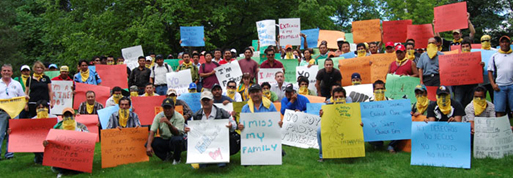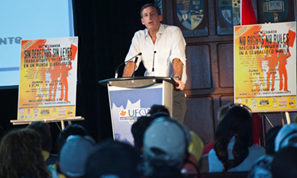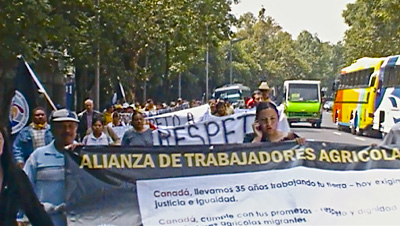
More than 300 migrant agriculture workers – the largest gathering ever of migrant workers in Canada – travelled to Toronto on June 20 to participate in No Rights, No Rules: Migrant Workers in a Globalized World — an international forum on the challenges, obstacles and exploitation faced by migrant and temporary workers in Canada.
The forum was hosted by UFCW Canada and community partners at the University of Toronto – just a block away from the Ontario legislature, where the McGuinty government continues to deny agriculture workers in Ontario the right to unionize.
Just before the forum began the workers assembled shoulder to shoulder, as a vast human billboard, holding signs in English and Spanish declaring “I’m a father too!” — putting a face to an exploited workforce that most Canadians aren’t aware of.
 |
But the Father’s Day forum was also about solutions, empowerment and continued solidarity with migrant and temporary workers in Canada.
“As we move forward and reach out today, we pledge our commitment to continue the work that we do,“ said National President Wayne Hanley in his welcoming remarks. “It is truly a privilege to see the faces of so many fathers, and mothers, with the determination to ensure that a human being is treated as such, and that the era of exploitation and abuse of the fundamental rights of migrant workers comes to a rapid end, and it all starts here today.”
The international forum was held just a week before the G20 Summit in Toronto — in part to raise awareness about the G20 globalization agenda to push down workers rights across all borders.
One participant who couldn’t cross the border was Max Correa, the General Secretary of Central Campesina Cardenista (CCC) – one of Mexico’s largest farm workers organizations. Brother Correa had been scheduled as a panelist but he could not attend due to delays in processing his visa. Instead he participated via video — sharing with the audience the history of struggle of everyday workers and peasants in Mexico.
Along with the CCC, other forum coalition partners included the Latin American Trade Unionists Coalition (LATUC), the Ontario Federation of Labour (OFL), Migrante Canada, Caregivers Action Centre, the Workers Action Centre, No One is Illegal, the Mennonite New Life Centre, and SAME (Students Against Migrant Exploitation).
“This event has been a call that the coalition for change moves forward,” said Naveen Mehta, UFCW Canada’s Director of Human Rights. “We must continue to move together as activists, advocates and trade unionists until migrant and temporary foreign workers in Canada have the justice and equality they rightfully and legally deserve.”

